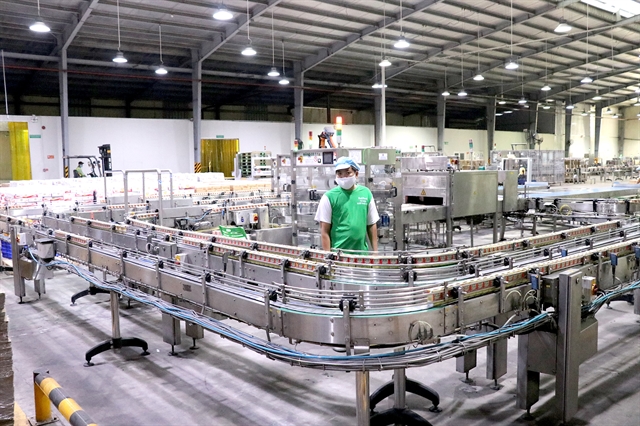 Economy
Economy

In the context of the ongoing COVID-19 pandemic and the pending Fourth Economic Revolution, experts are grappling with how best to invigorate sustainable growth for the economy.

|
| Workers on the production line at a factory of Binh Duong Nutifood Nutrition Food JSC in Bình Dương Province. Domestic businesses need more support to recover after the pandemic. — VNA/VNS Photo |
HÀ NỘI – In the context of the ongoing COVID-19 pandemic and the pending Fourth Economic Revolution, experts are grappling with how best to invigorate sustainable growth for the economy.
The options were discussed on Tuesday in a webinar held by the Business Forum Magazine, titled: “Restructuring the economy in the 2021-2025 period and the problems posed to businesses".
In his opening speech, Vice President Hoàng Quang Phòng of Việt Nam Chamber of Commerce and Industry (VCCI), said that the National Assembly, Government and relevant ministries and sectors have held many conferences and seminars to discuss solutions for the country’s sustainable development and economy.
He said after the 2016-2020 period, Việt Nam’s economic restructuring has achieved positive results. However, this was before the COVID-19 pandemic and the unpredictable developments of the world situation, meaning there is a lot of work that needs to be done to continue enhancing economic growth; enterprise restructuring was among them.
Phòng acknowledged that, despite positive results, the process of economic restructuring and growth renewal between 2016-2020 remained limited.
The growth rate of labour productivity was not high. A lack of science and technology application to enhance labour productivity was also a problem.
Việt Nam’s processing and manufacturing industries were mainly integrated with the midstream part with lower added value. Việt Nam was also involved in upstream activities but predominantly in low-value-added products such as plastic, glass, and packaging. The participation of Vietnamese companies remained low. The country heavily imported raw materials for garment and textile sectors and electronic components.
The private economic sector has failed to meet the size and growth of the national economy. The economy still relied too much on the foreign economic sector. Existing regulations have made it difficult to effectively implement solutions to restructure and renew economic growth, said Phòng.
To achieve the ambitions of becoming a middle-income economy by 2030 and a high-income one by 2045, with a labour productivity growth rate of at least 6.5 per year, Việt Nam economy needs to be further enhanced, said Phòng.
Amid the complicated COVID-19 situation, the pandemic's impacts have made new trends in investment, trade, digital transformation and rapid change of business models and production methods globally. This has generated both opportunities and challenges for the process of Việt Nam's economic restructuring.
Trần Thị Hồng Minh, Director of the Central Institute for Economic Management (CIEM), told participants that the country’s economic restructuring plan 2021-2026 period was a continuation of the economic restructuring plan for the 2016-2020 period, which has gained many results but also created challenges for the country’s economic growth, an increase of productivity, and competitiveness of the economy.
Minh said this plan aimed to focus on the renewal of the economic growth model to ensure macro stability while improving productivity, quality and competitiveness as the country gets ready for the Fourth Industrial Revolution.
She added it was vital for the country to develop science-technology-innovation based economic growth. This was a new point that will help recover and develop the economy in the next period, and in the context of the complicated COVID-19 pandemic. She noted that it was a need to inherit and further develop gained achievements in the previous period and give priority to the development of a number of key industries.
One of the five key goals of the 2021-2025 plan was to create a clear legal framework and a favourable business climate. Minh noted that it was very important to help businesses to be developed further. VNS




